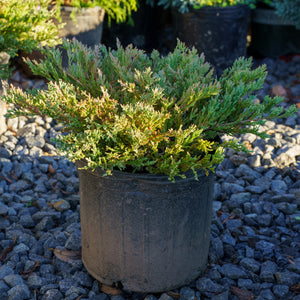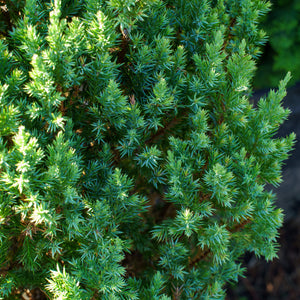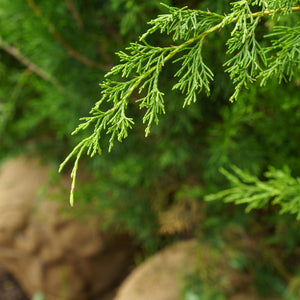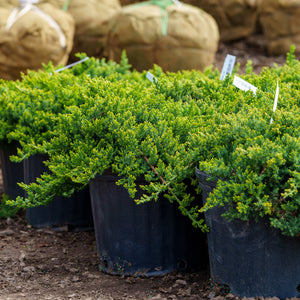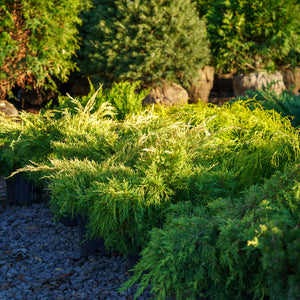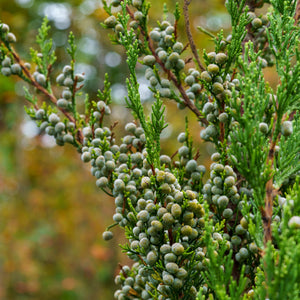The Juniper Guide
Junipers bring a timeless and resilient presence to any landscape. With their distinctive form, aromatic foliage, and remarkable adaptability, junipers have the power to captivate the eye and add a touch of rugged beauty to gardens and outdoor spaces. These remarkable plants are celebrated for their versatility and ability to thrive in a wide range of environments when given proper care and attention. Whether you seek to create a serene natural retreat or a striking focal point in your garden, junipers are an excellent choice that will undoubtedly leave a lasting impression.
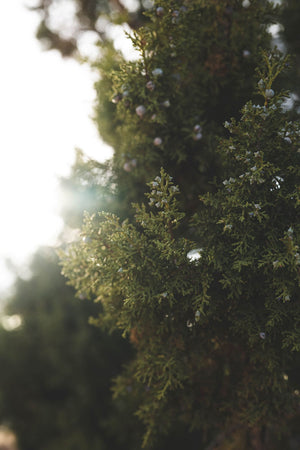
About
Juniper, belonging to the Juniperus genus, encompass a diverse group of evergreen shrubs and trees renowned for their enduring presence and ecological significance. With numerous recognized species, junipers are found across various regions of the Northern Hemisphere, including North America, Europe, and Asia. These remarkable plants are characterized by their distinct features and vital role in supporting local ecosystems.
One of the defining characteristics of junipers is their unique foliage, which consists of needle-like or scale-like leaves that remain green throughout the year. Junipers exhibit a wide range of leaf colors, including shades of green, blue, and gray, adding visual interest to their overall appearance. Some juniper species also produce small cones or berries, which can be decorative and provide food for wildlife.
Junipers hold great ecological importance, providing habitat and food sources for a diverse range of wildlife. Their dense foliage and resilient nature make them ideal shelter for birds and small mammals. In addition, the berries produced by certain juniper species serve as a valuable food source for birds and other animals during the winter months.
These versatile plants exhibit adaptability to different soil types and environmental conditions. While they generally prefer well-drained soil, junipers can thrive in a range of sun exposures, from full sun to partial shade. Their ability to withstand diverse climatic conditions, including hot and dry environments, makes them a popular choice for landscaping projects in various regions.
Whether used as a striking focal point in a garden, planted in groups to create a vibrant display, or incorporated into mixed borders, junipers impart a sense of resilience and natural beauty to any landscape.
By carefully selecting and nurturing junipers in your landscape, you not only enhance the aesthetic appeal of your outdoor space but also contribute to the preservation of these remarkable plants and the diverse ecosystems they support. Junipers bring enduring beauty and ecological value to your garden, making them a valuable addition to any landscape.
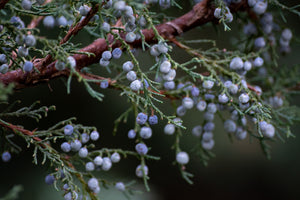
Planting
Junipers have specific planting requirements to ensure their successful establishment and growth. Here are some general guidelines for planting and caring for junipers:
Soil: Junipers thrive in well-drained soil that is not overly fertile. They are adaptable to various soil types, including sandy or rocky soils. Ensure good drainage by amending heavy clay soils with organic matter or sand. Avoid planting junipers in waterlogged or compacted soil, as it can lead to root rot.
Sunlight: Junipers prefer full sun to partial shade. Choose a location that receives at least six hours of direct sunlight each day. Junipers can tolerate some shade, but they tend to have better growth and foliage color in full sun.
Watering: Junipers have moderate water needs and are drought-tolerant once established. Water newly planted junipers deeply and thoroughly to encourage root development. Afterward, water them sparingly, allowing the soil to dry out slightly between waterings. Avoid overwatering, as it can lead to root rot.
Mulching: Apply a layer of organic mulch around the base of your junipers to conserve moisture, suppress weed growth, and regulate soil temperature. Use wood chips, bark, or compost as mulch, keeping it a few inches away from the stem to prevent excess moisture accumulation and potential disease issues.
Pruning: Junipers generally require minimal pruning. Remove any dead, diseased, or crossing branches to maintain a healthy and attractive form. Prune during late winter or early spring before new growth emerges. Use clean and sharp pruning tools to minimize the risk of infections.
By following these basic planting and care guidelines, you can ensure the successful establishment and healthy growth of your junipers. With proper care, junipers will thrive and bring beauty, texture, and evergreen interest to your landscape for years to come.
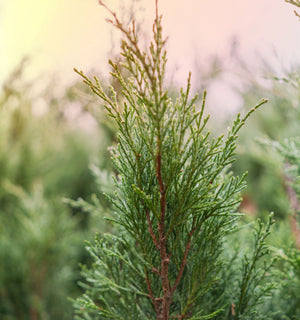
Care
Junipers require specific care to ensure their optimal growth and health. Here are some general guidelines for the care of junipers:
Watering: Junipers have moderate water needs and are drought-tolerant once established. Water newly planted junipers deeply and thoroughly to encourage root development. Afterward, water them sparingly, allowing the soil to dry out slightly between waterings. Avoid overwatering, as it can lead to root rot.
Pruning: Junipers generally require minimal pruning. Remove any dead, diseased, or crossing branches to maintain a healthy and attractive form. Prune during late winter or early spring before new growth emerges. Use clean and sharp pruning tools to minimize the risk of infections.
Fertilizing: Junipers typically do not require regular fertilization if planted in well-draining soil. However, if your soil is lacking in nutrients, you can apply a balanced, slow-release fertilizer in early spring. Follow the recommended application rates and timing provided by the manufacturer. Avoid over-fertilizing, as it can lead to excessive growth and weaken the plant.
Soil and Sunlight: Junipers are adaptable to various soil types, but they prefer well-drained soil. They can tolerate both full sun and partial shade. Provide at least six hours of direct sunlight each day for optimal growth. Partial shade can be beneficial in hot climates to protect the plant from excessive heat.
Mulching: Apply a layer of organic mulch around the base of your junipers to conserve moisture, suppress weed growth, and regulate soil temperature. Use wood chips, bark, or compost as mulch, making sure to keep it a few inches away from the stem to prevent excess moisture accumulation and potential disease issues.
Pests and Diseases: Junipers are generally resistant to pests and diseases. However, they can occasionally be affected by spider mites, aphids, or fungal diseases. Monitor your plants regularly for any signs of damage or disease and take appropriate measures if needed. Pruning away affected branches and maintaining overall plant health can help prevent and manage pest and disease issues.
By following these basic care guidelines, your juniper will thrive, providing beauty, texture, and year-round interest in your landscape. With proper care and attention, junipers will continue to enhance your outdoor space for many years to come.
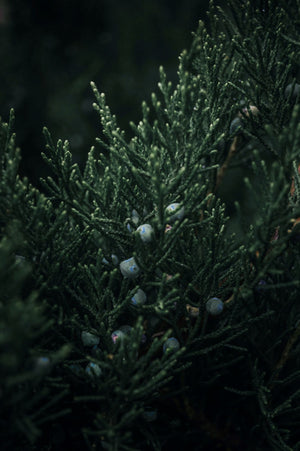
How To Use
Juniper offers versatility and can be used in various ways to enhance your landscape. Here are some recommendations based on their characteristics:
Focal Point: Juniper can serve as striking focal point in your landscape. Their unique forms, textures, and colors make them visually captivating. Plant a well-shaped juniper as a centerpiece in your garden or use multiple juniper varieties to create an eye-catching display.
Ground Cover: Juniper plants are excellent choices for ground cover due to their low-growing and spreading habit. They can help control erosion on slopes and provide a uniform and attractive carpet-like appearance. Choose spreading juniper varieties that suit your specific landscape needs.
Border or Hedge: Juniper can be used to create borders or hedges in your garden. Their dense growth and evergreen foliage make them effective at providing privacy and defining boundaries. Select upright juniper varieties for a formal hedge or use low-growing junipers for a natural-looking border.
Rock Gardens: Juniper plants are well-suited for rock gardens due to their ability to thrive in poor and rocky soils. Their compact forms and low maintenance requirements make them ideal choices for adding texture and interest to rockeries or dry landscapes.
Container Planting: Juniper plants can be grown in containers, making them versatile options for patios, balconies, or small spaces. Choose compact varieties that will remain manageable in containers and provide them with well-draining soil and regular watering.
Wildlife Habitat: Junipers offer shelter and food sources for various wildlife species. Birds and small mammals are attracted to juniper for nesting and foraging. By incorporating juniper into your landscape, you can create a welcoming habitat for local wildlife.
Drought-Tolerant Landscaping: Junipers are known for their ability to withstand drought conditions. Their water-wise nature makes them suitable for xeriscaping or areas with limited water availability. Use juniper plants in dry landscapes or as part of a water-efficient garden design.
Sculptural Element: Juniper plants with unique and twisted forms can be used as sculptural elements in your landscape. Their interesting shapes and textures add artistic appeal and can serve as focal points or conversation starters.
When selecting junipers for your landscape, consider their growth habits, sizes, and environmental requirements. Ensure they are planted in well-drained soil and provide appropriate sun exposure based on the specific juniper variety. With their versatility and resilience, juniper plants can add beauty, texture, and character to your outdoor space.
Conclusion
Juniper plants bring a distinctive and versatile presence to any landscape. With their unique forms, evergreen foliage, and adaptability, junipers are highly valued for their aesthetic appeal and practical applications. By following proper planting and care practices, you can maximize the benefits of juniper plants in your outdoor space and leave a lasting impression. Whether you desire an eye-catching focal point or a low-maintenance ground cover, junipers can fulfill various roles in your landscape design. Plant a well-shaped juniper as a centerpiece to add visual interest and texture, or use spreading varieties to create a lush and uniform ground cover. Juniper plants are also ideal for creating borders or hedges, providing privacy and structure to your garden. With their drought tolerance and ability to thrive in rocky or poor soils, junipers are well-suited for rock gardens or xeriscapes. Juniper plants can even serve as sculptural elements, showcasing their unique and twisted forms. By incorporating junipers into your landscape, you create a welcoming habitat for wildlife and contribute to the overall beauty and resilience of your outdoor environment. With their versatility, hardiness, and distinctive charm, juniper plants bring a touch of natural beauty and timeless elegance to your landscape.

